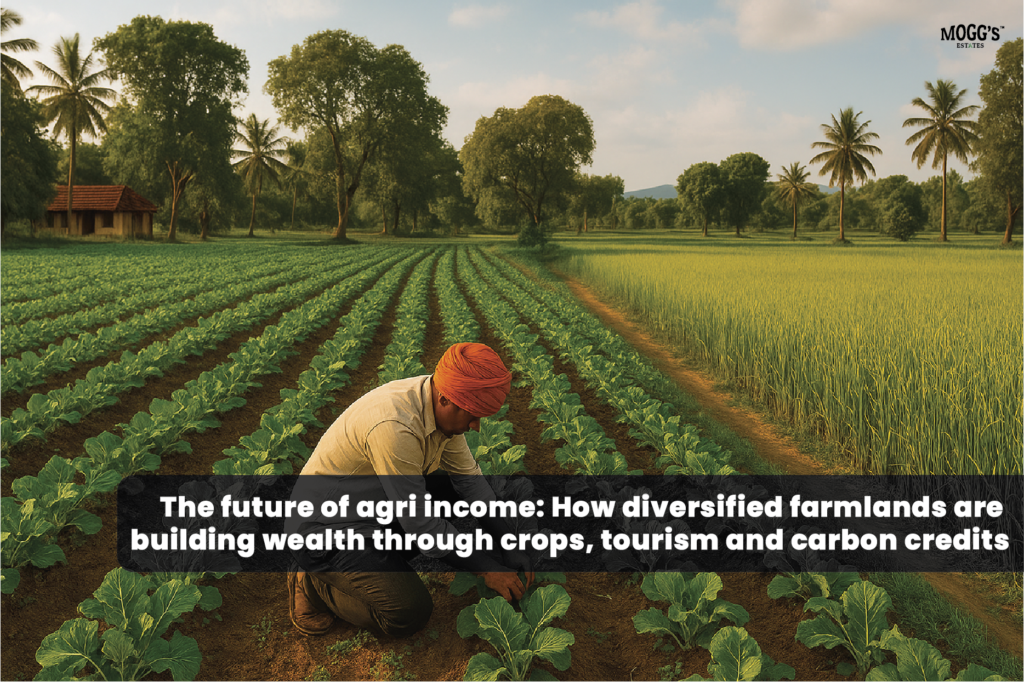For decades, farmland in India was seen as a simple source of crop income. Farmers planted, waited for the harvest season, and earned once or twice a year. It was a respectable livelihood, but it was never seen as a smart financial asset.
Today, that perception is changing. Farmland is becoming one of the most dynamic investment opportunities in India. It is no longer just about growing coconuts or mangoes. It is about creating multiple income streams from the same piece of land. Investors are finally looking at farmland as a wealth engine rather than a side asset.
This shift is being driven by three powerful trends: better crop management, the rise of farm tourism, and the expanding carbon credit economy. Together, they are transforming how landowners build long-term wealth.
And companies such as Mogg’s Estates are leading this transformation by making farmland ownership simple, passive, and profitable.
Why farmland diversification matters today
Anyone who has grown up around agriculture knows one thing. Nature does not always cooperate. Crop prices fluctuate. The weather can go wrong. Labor becomes expensive. Because of this, traditional farming was always uncertain.
Diversification reduces that risk. When one income stream slows down, another can stabilize returns. That is precisely what makes modern managed farmland brighter than ever before.
Farmland has something that other real estate does not. It can produce wealth year after year. It can feed families, host guests, restore the environment, and even get rewarded for sustainability.
Let us break down the three primary sources of farmland income that are redefining the investment landscape.
Strong and steady crop income
India loves fruits. Urban demand for coconut, mango, chikoo, custard apple, and lemon has never been higher. With improved irrigation and scientific care, yield per acre has increased significantly.
This is where managed farmlands shine. The landowner does not need to know anything about farming. A professional team takes care of:
• Plantation and crop selection
• Drip irrigation and water management
• Pest control and soil nutrition
• Secure fencing and farm supervision
• Harvesting and selling the produce
At Mogg’s Estates, each farm plot is cared for like a business asset. The trees are chosen for long-term growth. Some, like teakwood and mahogany, are part of future financial planning. Others, like coconut and mango, provide regular income year after year.
The result is simple. Owners enjoy the benefits without worrying about daily farm operations.
The rise of agro tourism and farm stay income
If there is one trend that has exploded after COVID, it is the desire to escape cities. People want silence, nature, fresh food, and meaningful weekends. Karnataka, especially Bengaluru, has become a hot market for countryside tourism.
Visitors want to:
• Milk cows
• Walk through plantations
• Live in aesthetic farm cottages
• Eat organic meals
• Enjoy peace and greenery
This demand had created a significant earning opportunity for landowners. Farmstays are no longer just a lifestyle experience. They are a serious source of passive income.
Mogg’s Estates introduced NatureBnB at TerraHill, the first assured income farmstay ownership model in India. The idea is powerful. You own the land and build your farmhouse. Mogg’s manages guest bookings, maintenance, and hospitality. You receive a fixed monthly income that does not depend on occupancy.
It is tourism and agriculture working together. And it is becoming one of the most reliable real estate income models in South India.
Carbon credits: Getting paid for sustainability
Here is something many investors are just learning about. Governments and global corporations pay incentives for plantations that improve the environment. When your land grows trees that absorb carbon dioxide, you can earn carbon credits. These credits can be sold to companies that want to reduce their environmental impact.
Long-term plantations such as coconut, mango, and teakwood qualify for carbon credit benefits. Which means the land makes money simply by being green.
For the first time, sustainability is becoming profitable. And this alone can boost farmland income in the future.
Multiple income streams on one land:
Put these three revenue sources together, and farmland becomes a powerful investment model:
1. Crop income
2. Farmstay income
3. Carbon credit income
Compare this with city real estate, where returns mostly come from appreciation alone. A diversified farmland grows both in value and in monthly earnings. It also gives something no apartment can: a peaceful escape whenever you need one.
This is where managed farmland surpasses traditional real estate.
Bengaluru: The capital of farmland investment.
Bengaluru is expanding in every direction. As people move towards the suburbs and outskirts, the appreciation potential around the city is rising. Areas with good highways, tourism routes, and water access are seeing strong investor demand.
This is why projects such as Mogg’s Sadhvana in Maddur and Mogg’s TerraHill near Kunigal are becoming preferred choices. They offer greenery, accessibility, and proven agricultural viability.
Investors are not just buying land. They are buying ease, security, and a better future. Farmland gives more than money.
Even if you never think about returns, farmland rewards you in different ways:
• A natural break from screens and traffic noise
• A stress-free retreat for the family
• Fresh harvests straight from your own land
• A deeper connection with nature
And most importantly, it becomes a legacy asset. Something that can be passed down to children and gain value over generations.
That is the emotional return on investment. Wealth that must also nourish wellbeing.
Why working with Mogg’s Estates makes a difference:
Buying land can be complicated. Legal paperwork, zoning approvals, soil testing, and agricultural planning are not easy to manage on your own. It requires the right expertise.
Mogg’s Estates simplifies everything. The team handles:
• Due diligence and legal transparency
• Managed farming and maintenance
• Smart infrastructure and irrigation
• Optional farmhouse development
• Marketing and operations for farmstays
• Annual reports on plantation growth
Your investment remains in safe and experienced hands.
A smarter investment for the next generation
The modern buyer is different. They care about purpose as much as profit. They want assets that grow, protect nature, and improve their quality of life.
Managed farmland fits this mindset perfectly.
It combines:
• Long-term appreciation
• Regular passive income
• A healthier and more meaningful way of living
It is real wealth that you can see, touch, breathe, and enjoy.
Farmland is finally stepping into the spotlight, not as a nostalgic idea, but as the future of smart investing.
The time to diversify is now.
Land will never lose value. Food and nature will never go out of demand. Agro tourism and sustainability will only grow from here.
That is why diversified farmland income is becoming one of the strongest investment strategies in India.
If you are ready to explore farmland ownership around Bengaluru, visit Mogg’s Estates and see the opportunity in front of you. A better future begins with better land.




